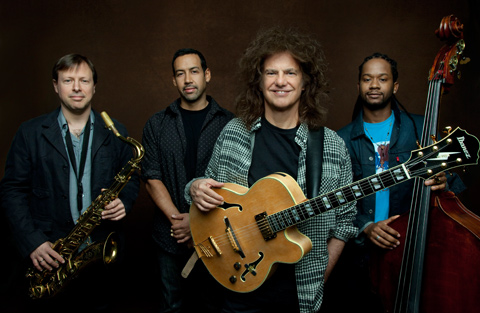
FRIENDS The Unity Band — like Metheny's whole career — is about reconciling different styles. |
Pat Metheny's career has in a sense been defined by his omnivorous curiosity. Whether he's taking off on a free-improv skronk fest with guitarist Derek Bailey, playing in a straightahead jazz-guitar trio with Dave Holland and Roy Haynes, or plying his personal brand of lyrical, electrified small-ensemble jazz with the Pat Metheny Group, nothing is out of bounds. All of which makes his latest project, the Unity Band, a logical next step. Next weekend he brings Unity Band to the Lowell Summer Music Series (August 3) and the venerable Newport Jazz Festival (August 4).
The band's name (also the title of their new Nonesuch album) is fitting. Despite his all-encompassing range, Metheny's career has been about the unity of all things musical, and if that has a bit of an evangelical cast, it's no accident — the guitarist and composer cites his musical experiences in the Unity Church from his Missouri childhood as an explicit reference.
The format is a traditional one — the tenor-sax quartet. Its precursor is Metheny's landmark 80/81 band and double-LP on ECM, the last time he led a "saxophone band." That band featured Michael Brecker and Dewey Redman. This time it's Chris Potter, who, like Metheny, always seems up for anything, whether it's fronting Dave Holland's groups, playing alongside Dave Douglas in that trumpeter's bands, or leading his own Fender Rhodes-centered avant-jazz-funk Underground band. Here he galvanizes the sound of Unity Band, helping to shape the dramatic arc of each of the nine Metheny originals. Sometimes it's a matter of one of Metheny's knotty folk-like themes taking on a Coltrane-ish fury, like "Leaving Town," where he and bassist Ben Williams each briefly quote "A Love Supreme." Elsewhere, he provides free-form color with bass clarinet, or goes head-to-head with Metheny's Roland synthesizer guitar in the Afro-vamp "Come and See." Underneath it all, Metheny's long-time drummer Antonio Sanchez maintains fluid command of shifting meters as well as finding a kind of unity in the disparate sounds of jazz swing and Latin "even-eighth" grooves.
Williams, the youngest member of the band, is a tonic throughout, providing both propulsion and melodic buoyancy with his inventive patterns. When I ask Metheny via e-mail to compare Williams with two previous Metheny bass players, Christian McBride and Larry Grenadier, his answer sums up his attitude to music in general. The three bassists he says, all have "a wide sense of what music can be and are capable of functioning at a high level across a whole spectrum of possibilities."
Then, reflecting on jazz's generations, the 58-year-old adds, "It's funny, but the generation that immediately followed mine, the so called 'young lions,' was always a big mystery to me. It seemed like a bunch of people who were mostly playing for the approval of their parents — which was kind of the opposite of the way that I came up. Then those guys came along who were all born around 1970 or so, and I really got excited about their openness to all sorts of possibilities . . . . Josh (Redman), Brad (Mehldau), Brian (Blade), and they all seemed to understand and gravitate towards my thing too. . . . Now the generation of guys like Ben is coming along. What I like about them is they are most definitely NOT playing for their parents — they are playing for their friends. That is the way I always was too."